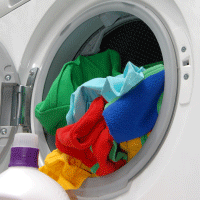
Energy Saving Tips for Your Washer & Dryer
Washing and drying clothes can use lots of water and electricity and can cost you a pretty penny if you’re not careful. The average American family does almost 400 loads of laundry per year, and, with a conventional washing machine, uses about 40 gallons of water for a full load.
Using high efficiency (HE) front-loading clothes washers can help you reduce bill on electricity. Such washers can cut the electricity you use to wash clothes by up to 70 percent, and, over the life of the machine, can save you more than $850 in water and detergent costs.
But whether you use conventional or HE washers and dryers, there are several things you can do when washing and drying clothes that can save you more energy and put more money back in your pocket each month.
Saving Energy with Clothes Washers
– Wash full loads because washers use almost the same amount of energy regardless of the size of the load.
– Use cold water since heating water accounts for about 90 percent of a washer’s energy consumption. Unless your clothes have oily stains, cold water will clean them just fine. And avoid the high heat sanitary cycle if your washer has one, as it significantly increases energy use as well.
– Use a high spin speed to remove as much moisture from your clothes as possible so you don’t have to use as much energy drying them.
Saving Energy with Clothes Dryers
– Air-dry clothes whenever possible to avoid drying costs and help your clothes last longer.
– Use the moisture sensor on your dryer, if it has one, to automatically shut off the machine when your clothes are dry. You’ll save energy and decrease the wear and tear on your clothes.
– Clean the lint filter between each load to maximize the air circulation and efficiency of the dryer, and scrub the filter regularly if you use dryer sheets, as they can leave a residue of film that builds up over time and reduces circulation.
Sources
California Energy Commission Consumer Energy Center website, Clothes Washers.
Energy Star website, Clothes Washers Best Practices.
Also Read:
Top 5 Reasons your Electricity Bill is so High



